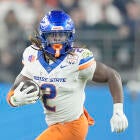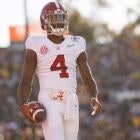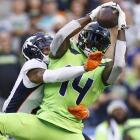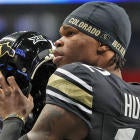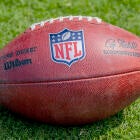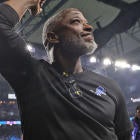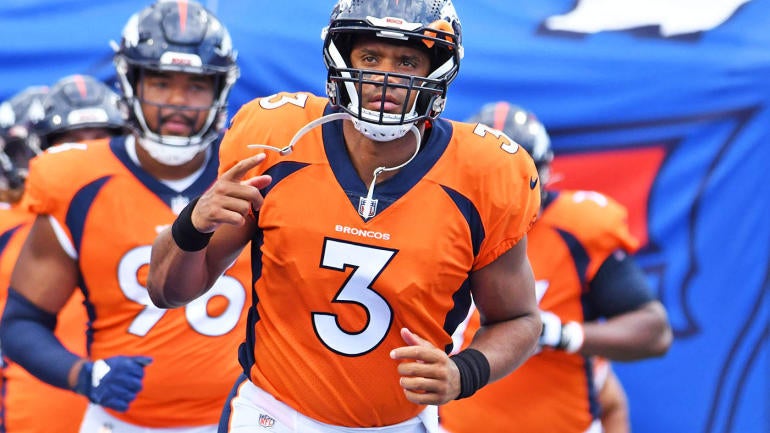
Broncos Country, let's panic? Two weeks into the 2022 NFL season, it's probably unfair to write off any player or team, let alone a player and team working together for the first time. It is, however, fair to note just how ugly Denver's big quarterback gamble has looked now that Russell Wilson has rocked orange as Mile High's signal-caller both at home and on the road. Make no mistake: Russ and the Broncos won on Sunday against the Texans, and winning cures all, as they say. But was it supposed to be this hard?
On paper, Wilson was just fine in Week 1 against his old friends in Seattle, finishing 29 of 42 for 340 yards, one touchdown and no turnovers, averaging 8 yards per attempt and posting a 101.3 passer rating. His signature lofty deep balls emerged late to threaten a Broncos comeback. And yet the offense under his lead didn't hold a single lead against the Seahawks. He struggled to establish chemistry with his wideouts early. He at times aided Seattle's pass rush by holding onto the ball. And, most egregiously, he was a passive accomplice to coach Nathaniel Hackett's inexplicably conservative decision-making in the closing seconds of a one-score loss.
On Sunday, in Week 2's win over the Texans, Wilson got the "W," once again delivering a deep floater late, this time to tight end Eric Saubert for a go-ahead score. But individually, he was even worse. Completing less than half of his 31 passes while absorbing three sacks, one of which he stumbled into on his own, Wilson oversaw a 3-for-12 third-down performance and extended Denver's streak of failed red-zone efforts against a rebuilding Houston defense. Meanwhile, his mental pairing with Hackett continued to plague the club from a strategic standpoint -- so much so that Broncos fans literally mass-chanted the play clock at the stadium in an attempt to help their star QB avoid delay-of-game penalties.
It's not so much that Wilson alone is the problem. Far from it. Hackett's early situational play designs have left a lot to be desired, and Javonte Williams' usage as a potential featured back has been scattershot. But when you pay such a steep price for a seemingly franchise-altering QB, you expect instant results. You expect a transcendent talent -- someone who single-handedly offsets surrounding issues. That may be unfair to Wilson, but the Broncos are responsible for whatever pressure lies on his shoulders. They paid the price -- literally, and twice -- for Russ to be their savior, first by trading a mega package for his services in March, then by handing him a $245 million extension on Sept. 1, before he took a single snap in their uniform.
Two weeks into the season, there is plenty of time for Wilson to get the Broncos on a smoother track, and into the class of legitimate playoff hopefuls. The majority of his NFL resume confirms he can, and suggests he will, do as much. The irony, however, is that Wilson's long-awaited bolt from Seattle for greener -- er, more orange -- pastures has brought him to a Broncos team that, so far, looks an awful lot like the worst versions of his former old-school Seahawks offense. Ugly games. Lots of boring aerial strategy focused on the tight ends. A need to rely on the run game and defense.
That strategy can lead to victories, to be clear, but it's increasingly ill-suited for today's NFL. And that, frankly, is the $245M question surrounding Wilson already: is he, good setup or not, still suited for QB stardom in today's NFL? Or is it possible, at 33, coming off an injury and the most immobile, unproductive stretch of his 10-year Seahawks career, desperate to headline a new market once dominated by greats like John Elway and Peyton Manning, that Russ is no longer that guy? The Broncos, you can bet, are praying that's not the case. And, hopefully, looking in the mirror to see how they can help.
![[object Object] Logo](https://sportshub.cbsistatic.com/i/2020/04/22/e9ceb731-8b3f-4c60-98fe-090ab66a2997/screen-shot-2020-04-22-at-11-04-56-am.png)










